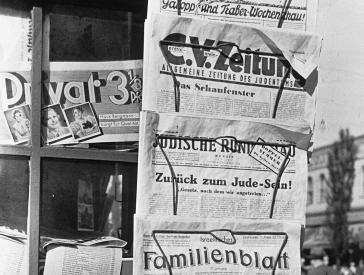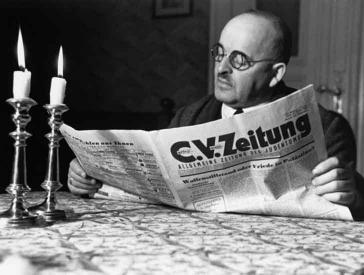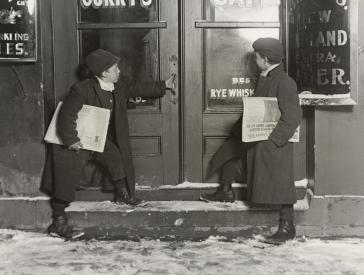Press invitation to the award ceremony of the 21st Prize for Understanding and Tolerance
Herta Müller and Barrie Kosky receive the Prize
Press Release, Tue 11 Oct 2022
On Saturday, 12 November 2022, the Jewish Museum Berlin will present the Prize for Understanding and Tolerance for the twenty-first time. This year the honor will be awarded to the writer and Nobel laureate Herta Müller and to the theater and opera director Barrie Kosky. The tribute to Herta Müller will be delivered by the writer and translator Ernest Wichner; the music critic Julia Spinola will speak in praise of Barrie Kosky. Hetty Berg, director of the Jewish Museum Berlin, will present the awards.
- Kontakt
-
Dr. Margret Karsch
Press Officer
T +49 (0)30 259 93 419
presse@jmberlin.de
- Address
Jewish Museum Berlin Foundation
Lindenstraße 9–14
10969 Berlin
The Prize for Understanding and Tolerance
Since 2002, the Jewish Museum Berlin has conferred the Prize for Understanding and Tolerance on individuals from the realms of culture, politics, and business who have rendered outstanding service in the interest of promoting human dignity, international understanding, the integration of minorities, and the coexistence of different religions and cultures. The prize is traditionally presented at a gala dinner, awarded jointly by the Jewish Museum Berlin and the Friends of the Jewish Museum Berlin.
Media Coverage and Accreditation
Journalists interested in covering the event should please contact us by 10 November 2022, 12 noon, by email at presse@jmberlin.de. Due to high security restrictions and limited space for representatives of the media, accreditation carried out by the Press Office of the museum will be granted to individuals and is non-transferable. Media representatives lacking accreditation cannot be admitted on November 12. With your confirmation of accreditation you will also receive the detailed schedule of the events and a summary of the COVID rules then in effect. During the evening, a catered meal will be served for media representatives in the press lounge.
Press images will be available for download from 13 November, 11 am, at Bildmaterial für die Pressearbeit .
Guests Confirmed to Date from the Realms of Politics, Business, Culture, and the Media
Iris Berben, actor; Dr. h.c. Joachim Gauck, Federal President Emeritus of Germany; Dr. Andreas Görgen, Chief Officer for the Federal Government Commissioner for Culture and Media; Dr. Felix Klein, Federal Government Commissioner for Jewish Life in Germany and the Fight against Antisemitism; Christine Lambrecht, Federal Minister of Defence; Christian Lindner, Federal Minister of Finance; Milena Rosenzweig-Winter, Managing Director of the Jewish Community of Berlin; Wolfgang Schäuble, President Emeritus of the Bundestag
The Prizewinner Herta Müller
Herta Müller is a political person. The Nobel Prize for literature is not solely a literary prize, but also a political one. The Swedish Academy has awarded it every year, with just a few exceptions during the two world wars, to the author who, “in the field of literature, produced the most outstanding work in an idealistic direction.”
Herta Müller received that prize in 2009. Her work shows that language can create spaces of freedom and that it can liberate us – whether from the repressions of a dictatorship or from the restrictions that prevail within groups or personal relationships.
Herta Müller was born in 1953 in the Romanian People’s Republic, and grew up as part of the German-speaking minority in the Banat region. Her father had served in the Waffen-SS during the Second World War, and her mother – like many ethnic German Romanians – was deported in 1945 to today’s Ukraine, where she spent five years in a labor camp. Herta Müller studied German and Romanian literature at the University of Timişoara from 1973 to 1976. She moved in the same circles as the “Aktionsgruppe Banat”
, a group of young German-language writers who fought for freedom of expression in Nicolae Ceauşescu’s neo-Stalinist dictatorship. As a result, she was threatened and harassed by the Securitate – the Romanian intelligence service and secret police from 1948 to 1990. Her debut, a collection of short stories entitled Niederungen (Nadirs), which recounts the life of the ethnic Swabians in a Banat village, could not be published at all for many years; a censored edition finally appeared in Bucharest in 1982. Rotbuch, a publisher based in West Berlin, brought out the full version in 1984.
In her 1991 collection of essays on poetics, Der Teufel sitzt im Spiegel: Wie Wahrnehmung sich erfindet (The Devil Is in the Mirror: How Perception Invents Itself), Herta Müller explains her way of writing as follows: “I notice it in the texts of other authors, I feel it from books. What encircles me, what takes its course as I read, is what falls between the sentences with a bump or makes no sound at all. It’s what is left out.”
These omissions set the rhythm of her descriptions – in Nadirs, she often lines up short, simple sentences one after the other. The social conditions and situations she describes may provoke different associations and feelings in each reader, depending on their own particular circumstances, but probably everyone can sense the tension between the sentences and between the characters involved. Müller was much criticized by the Banat Swabian community for her unsparing portrayal of her compatriots in Nadirs. But she also earned praise for her courage in identifying disunity, a task that is necessary if entrenched divisions are to be overcome.
In 1987, Herta Müller left what was now called the Socialist Republic of Romania, ruled by Ceaușescu since 1965 (he remained in power until 1989), and emigrated to West Germany. Her writing powerfully probes the continuing violence of dictatorships as they restrict or strip away liberties, violate human dignity, and inflict trauma. She is also an outspoken critic of power relations inside families and ethnic groups.
In a democracy, the concepts of “understanding” and “tolerance” have immense importance. They are about diversity as a fundamental value, recognition and respect, listening to each other, accepting the fact that others have different beliefs – about talking together and living together. What distinguishes Herta Müller is the clarity of her stance on these values: her belief that understanding and tolerance must always and only be considered in the particular, concrete context in which they are to prevail. She measures the weight of words and deeds with great precision.
In an interview with the news magazine Der Spiegel on 5 February 2022, Herta Müller said: “In a dictatorship, literature is politicized by reality. By observing and describing things precisely, you create a certain distance from them, and that can help you, even save you.”
In Müller’s 2009 novel Atemschaukel (translated as The Hunger Angel in 2012), the women sing as they are carried to the labor camp in a cattle truck: “Always the same solemn song, to the point where you no longer knew whether it was really being sung or not, because the air was singing. The song rocked back and forth inside your head, and fit the rhythm of the ride – a Cattle Car Blues, a Song of the Time Set in Motion. It became the longest song of my life, the women sang it for five whole years until the song became as homesick as we were.”
Herta Müller’s use of metaphor creates a certain distance, yet her images get under our skin. Her writing often places great demands on readers – challenges to which they must, or wish to, respond. Throughout, the works wrestle with a relentless quest for truth, to the degree that we can determine truth from facts and use it as a basis for understanding. In that spirit, the Jewish Museum Berlin and the Friends of the Jewish Museum Berlin award the Prize for Understanding and Tolerance to Herta Müller.
The Prizewinner Barrie Kosky
Barrie Kosky became artistic director of the Komische Oper Berlin in 2012, and in the ten years that followed, he brought Jewish culture back on stage. In 2013, the magazine Opernwelt voted the Komische Oper “Opera House of the Year”
; in 2015, its choral soloists were “Opera Chorus of the Year”
and the ensemble won the International Opera Award for best company. Barrie Kosky was Opernwelt’s “Best Director”
in 2016. This year, experts and theater-goers alike have been celebrating Barrie Kosky’s ten-year spell as artistic director and his recent and earlier theatrical achievements. He is famous worldwide – the New York Times has called him “the Australian-born director who has become an essential figure of the Berlin, not to mention European, opera scene.”
Barrie Kosky’s managership of the Komische Oper Berlin ended in summer 2022, but he remains firmly connected to the institution as an in-house director.
Barrie Kosky was born in Melbourne in 1967, the grandson of Russian-Jewish, Polish-Jewish, and Hungarian-Jewish immigrants. His Budapest-born grandmother took him to the opera regularly from an early age. At 23, Kosky founded a Jewish theater in Melbourne with friends and called it Gilgul. In Kabbalah – Jewish mysticism – “gilgul”
is a concept of the transmigration of souls. Kosky expressly wanted the Gilgul company to present the diversity of Jewish positions to multicultural Australian audiences. Since then, his productions have explored Jewish culture and identity with depth and commitment. “We play at full throttle; there are no compromises,”
he said during a Mosse Lecture at Berlin’s Humboldt University. He once described himself as a “gay Jewish kangaroo”
and his productions as a mix between Franz Kafka and The Muppet Show. Kosky became a German citizen in 2017.
Barrie Kosky has brought forgotten operettas by Jewish composers and librettists, popular during the Weimar Republic and deeply influential for cultural life in pre-1933 Berlin, back to theater repertoires. They include Paul Abraham’s Ball at the Savoy, Oscar Strauss’s The Pearls of Cleopatra, and Jaromir Weinberger’s Spring Storms. Jewish choreographers and singers were also involved in these productions at the time. In 2017, Kosky became the first Jewish director to stage a production at the Bayreuth Festival: Richard Wagner’s Die Meistersinger von Nürnberg. As well as showing Wagner’s individual antisemitism, Kosky’s production underlined the much more widespread, aggressive hatred that faced Jewish people in those days – and still faces them today. At the same time, Kosky shed light on the ambivalent relationship of many Jewish music lovers with Wagner. There were Jewish Wagner fans who took their record collections with them when they fled Nazi Germany for Britain or Palestine, as is evidenced by objects on display in the Jewish Museum Berlin’s new core exhibition.
Barrie Kosky is an exceptional artistic figure. Both his work and his person symbolize contemporary German-Jewish culture and German-Jewish life in Berlin – even though when interviewers ask about his Jewishness, he always emphasizes that he only speaks for himself. He offers his audiences new access to a largely forgotten domain of Jewish culture. Barrie Kosky’s All Singing, All Dancing Yiddish Revue, in Yiddish, English, and German, brilliantly concluded his ten years as artistic director of the Komische Oper Berlin. The New York Times reviewer was enthusiastic: “Under Kosky – a showman through and through, who operates with a young idealist’s belief in the power of theater and a brazen disregard for divisions between so-called high and low art – the Komische Oper has been the kind of place where you could see Schoenberg’s Moses und Aron one night and Mozart the next, followed by a Broadway musical, a Weimar-era operetta and, for good measure, something Baroque.”
Barrie Kosky succeeded in making the Komische Oper Berlin a place for everyone; he raised the percentage of seats sold from less than 70 to more than 90 percent. There is an unparalleled lightness of touch to the way he sets his own accents, creates productions that are both profound and entertaining, and tackles difficult topics while always celebrating life.
Being open to conversation is key to Barrie Kosky’s personality. And understanding and tolerance are values he lives by. He places great trust in the artists he works with, giving them the space they need and considering himself the “company’s mom,”
as he put it in an interview with the Berlin daily Der Tagesspiegel. His statements are often polemical and provocative, but in conversation, he always focuses on the arguments. He does not evade conflict or shy away from dialogue, but takes up the challenge of debate – always seeking the truth here and today. Tomorrow the truth will have to be sought afresh, just as the Talmud must constantly be interpreted anew. In that spirit, the Jewish Museum Berlin and the Friends of the Jewish Museum Berlin award the prize to Barrie Kosky, one of the most important contemporary Jewish voices.
2002 to 2021 Prizewinners
Past recipients of the Prize for Understanding and Tolerance of the Jewish Museum Berlin are: Berthold Beitz, Chairman of the Curatorium of the Alfried Krupp von Bohlen and Halbach Foundation, and Heinrich von Pierer, former Chairman of the Siemens AG Board (2002); former Federal Minister for Internal Affairs Otto Schily and publisher Friede Springer (2003); the entrepren€ Michael Otto and former Federal President Johannes Rau (2004); the art collector and patron Heinz Berggruen and the politician Otto Graf Lambsdorff (2005); Daniel Barenboim, General Music Director of the Berlin State Opera, and the BMW manager Helmut Panke (2006); former Federal Chancellor Helmut Kohl and the historian Fritz Stern (2007); the corporate consultant Roland Berger and the Hungarian Nobel Laureate in Literature Imre Kertész (2008); Franz Fehrenbach, Chairman of the Board of the Robert Bosch GmbH, and Christof Bosch, spokesperson for the family and member of the Supervisory Board of the Robert Bosch Foundation GmbH – both as representatives of the Bosch Group – and the film director Michael Verhoeven (2009); literary scholar Jan Philipp Reemtsma and business executive Hubertus Erlen (2010); Federal Chancellor Angela Merkel (2011); Klaus Mangold, chairman of the Supervisory Board of Rothschild GmbH (Frankfurt and Moscow), and former Federal President Richard von Weizsäcker (2012); Berthold Leibinger, Trumpf GmbH, and actress Iris Berben (2013); publisher Hubert Burda and German Minister of Finance Wolfgang Schäuble (2014); W. Michael Blumenthal, founding director of the Jewish Museum Berlin (2015); historical eyewitnesses Renate Lasker-Harpprecht and Anita Lasker-Wallfisch and businessman Hasso Plattner (2016); Joe Kaeser, Siemens President and CEO, and Joachim Gauck, former President of the Federal Republic of Germany (2017); the entrepren€ Susanne Klatten and the writer David Grossman (2018); German Minister of Foreign Affairs Heiko Maas and the artist Anselm Kiefer (2019); former U.S. Secretary of State Madeleine K. Albright and the pianist Igor Levit (2020); the president of the Israelitische Kultusgemeinde München und Oberbayern Charlotte Knobloch and the architect Daniel Libeskind (2021).




